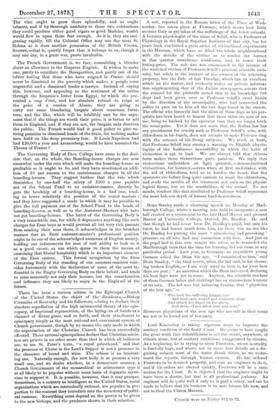There has been a curious schism in the Episcopal Church
of the United States the object of the dissidents, —Bishop Cummins of Kentucky and his followers,—being to declare their absolute repudiation of the high sacramental theory of the epis- copacy, of baptismal regeneration, of the laying-on of hands as a channel of divine grace, and so forth, and their attachment to episcopacy simply as the most rational and convenient system of Church government, though by no means the only mode in which the organisation of the Christian Church has been successfully effected. These rational episcopalians declare that Christian minis- ters are priests in no other sense than that in which all believers are, to use St. Peter's term, "a royal priesthood," and that the presence of Christ in the Lord's Supper is not a presence in the elements of bread and wine. The schism is an interest- ing one. Naturally enough, the new body is at present a very small one, and we doubt whether, in a democratic country, a Church Government of the monarchical or aristocratic type is at all likely to be popular without seine basis of dogmatic mysti- cism to support it. It is possible, however, that it may prosper. Sometimes, in a country as intelligent as the United States, social organisations which are intrinsically rational, are popular in pro- portion to the contrast they introduce into the monotony of politi- cal customs. Everything must depend on the power to be given to the new bishops, and the prudence shown in their selection.


































 Previous page
Previous page